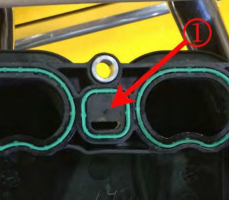— A GM 2.4L PCV lawsuit alleges the positive crankcase ventilation systems are defective and cause vehicles to lose oil and power.
The General Motors lawsuit says the PCV system contains an orifice that gets blocked with snow and ice in cold weather.
In addition, sludge and water plugs the PCV system and causes the rear main engine seal to rupture as pressure grows in the crankcase.
The plaintiffs also claim the PCV system problems in cold weather can cause permanent engine damage.
The GM PCV lawsuit includes these models.
- 2010-2016 Buick Lacrosse (including Hybrid, eAssist)
- 2011-2017 Buick Regal
- 2012-2017 Buick Verano
- 2010-2015 Chevrolet Captiva
- 2010-2017 Chevrolet Equinox
- 2013-2014 Chevrolet Malibu (including ECO, eAssist, Hybrid)
- 2010-2017 GMC Terrain
According to the PCV lawsuit, General Motors knew the systems were defective because the automaker sent technical service bulletins to dealerships regarding what to do if customers complained.
The plaintiffs assert the TSBs prove GM knew the PCV systems were defective, especially in cold weather.
General Motors PCV TSBs
A February 2013 TSB PIP5093 referenced complaints of an “oil leak . . .coming from the rear main oil seal of the engine” in certain vehicles that “may be the result of a frozen PCV system and excessive crankcase pressure.”
Technicians were told to clean the GM PCV system and “the customer may . . . consider changing their engine oil right before winter starts.”
A January 2014 bulletin superseded the PIP5093 bulletin and expanded the affected vehicles. The TSB said customers should change their oil before winter and advised technicians to clean out the PCV system using a 1/16 inch drill bit.
In January 2016 and 2019 TSB PIP5093 was updated again, and a February 2019 update referenced a “diagnostic tip,” continuing to recommend the use of a drill bit to clear the PCV orifice.
GM PCV Lawsuit Partly Dismissed
General Motors filed a motion to dismiss the PCV lawsuit and argued the plaintiffs live in only six states and allegedly cannot bring claims on behalf of a nationwide class action lawsuit.
However, Judge Mark A. Goldsmith said he would not address the nationwide class action argument at this stage of the lawsuit.
But the judge did rule on several claims in the GM PCV lawsuit, including these allegations that were dismissed.
The judge granted GM's motion to dismiss:
- Common law fraudulent concealment claims brought under the laws of Wisconsin, Michigan and Massachusetts.
- Claims brought under the Illinois Consumer Fraud and Deceptive Business Practices Act.
- Claims brought under the Minnesota Deceptive Trade Practices Act.
- Claims brought under the Wisconsin Deceptive Trade Practices Act, to the extent those claims are based on omissions.
- All implied warranty claims including Magnuson-Moss Warranty Act claims; and breach of contract claims based on contracts with dealerships not authorized by GM.
However, the judge allowed the following claims to survive.
- Claims brought under New York and Minnesota fraudulent concealment theories.
- Claims brought under New York General Business Law §§ 349 and 350.
- Claims brought under the Wisconsin Deceptive Trade Practices Act, to the extent those claims are not based on omissions.
- Breach of contract claims based on contracts with GM dealerships.
- Unjust enrichment claims.
Much will depend on when and how the judge rules regarding a nationwide class action lawsuit.
The GM PCV lawsuit was filed in the U.S. District Court for the Eastern District of Michigan: Kiriacopoulos, et al., v. General Motors LLC.
The plaintiffs are represented by the Miller Law Firm, P.C., and Hagens Berman Sobol Shapiro LLP.

